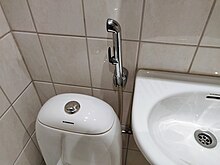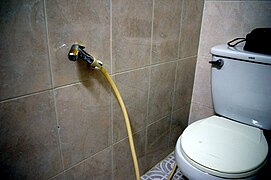Bidet shower

A bidet shower—also known as a handheld bidet, commode shower, toilet shower, health faucet, bum shower, jet spray, hand shower, shatafa (from the Arabic: شَطَّافَة [ʃɑtˤˈtˤɑːfɑ], "hand shower rinser") or bum gun—is a hand-held triggered nozzle that is placed near the toilet and delivers a spray of water used for anal cleansing and cleaning of the genitals after using the toilet for defecation and urination. The device is similar to that of a kitchen sink sprayer.[1] In Pakistan it is commonly known as Muslim shower.[2][3]
In predominantly Catholic countries,[4] the Muslim world,[5] the Eastern Orthodox[6] South Asia, and some Protestant countries such as Finland, water is usually used for anal cleansing, using a jet (bidet shower, bidet) or vessel, and in some places a person's hand (in some places only the left hand) is used.
Description
[edit]
The shower is a source of water for people who prefer using water rather than other methods of cleansing after defecation or urination.[7] The shower is an alternative for the traditional sources of water for this action, such as the bidet, copper pot or bucket and mug, being more hygienic and compact. There is no contact between the spray of water and the used water drainage.
-
Typical faucet installation
-
Faucet close up
-
A Finnish model, manufactured by Oras
-
A bidet shower at the Waldorf Astoria New York
-
Setup with dedicated mixing faucet
Usage
[edit]The user aims the faucet and sprays water at the anus or genitals to assist in cleansing after using the toilet. Toilet paper may be used to clean and dry, or a towel can be used to dry. The bidet shower can also be disinfected using disinfectant wipes, disinfectant spray, or other means after use.
Prevalence
[edit]The bidet shower is common in the Middle East, South Asia, Southeast Asia, South America, North Africa, etc., where water is considered essential for anal cleansing. This includes Algeria, Bangladesh, Brazil, Cambodia, Egypt, India, Indonesia, Iran, Iraq, Malaysia, Maldives, Nepal, Pakistan, Philippines, Singapore, Saudi Arabia, Sri Lanka, Thailand, United Arab Emirates, Vietnam etc. In some of these countries, it is commonly installed in Western-style (sitting) toilet installations. In Pakistan, India, Thailand, and the Arabian Peninsula it is common in both Western-style toilets and squat toilet installations. It is so ubiquitous that Thai parliamentarians were outraged upon learning that the toilets in their new parliament building were not equipped with Muslim showers.[8] The bidet shower is similar in intent, if not method of use, to the Japanese washlet-style toilet seats, or so-called "electronic bidets".
Bidet showers are used by Muslims in Muslim countries and all parts of the Arab world as well as in Asia in order to cleanse themselves with water after using the toilet, as a part of Islamic toilet etiquette.[9][10] Here, water is commonly used instead of, or together with, toilet paper for cleaning after defecation. This practice was made well known to European football fans visiting Qatar during the 2022 FIFA World Cup.[11] In Arabic, the shower is called a shattafa (شَطَّافَة).
The use of water in many Christian countries is due in part to the biblical toilet etiquette which encourages washing after all instances of defecation.[12] The bidet is common in predominantly Catholic countries where water is considered essential for anal cleansing,[13][14] and in some traditionally Orthodox and Protestant countries such as Greece and Finland respectively, where bidet showers are common.[15] In Europe, the bidet shower is used for example in Finland and Estonia.[16] Bidets are more common bathroom fixtures in many southern European countries.
See also
[edit]References
[edit]- ^ Ewudolu, Stella-maris (6 September 2018). "And now, a movie about the humble 'bum gun' (video)". AEC News Today. Retrieved 15 August 2019.
- ^ Muneeb-ur-Rehman, Mufti (2019-01-25). "کموڈ استعمال کرتے وقت پاکی کیسے حاصل کریں؟". Daily Jang (in Urdu). Retrieved 2024-12-23.
- ^ "استنجے کے لیے بیگ میں رکھنے والا الیکٹرانک لوٹا تیار". Express News (in Urdu). 2020-01-18. Retrieved 2024-12-23.
- ^ E. Clark, Mary (2006). Contemporary Biology: Concepts and Implications. University of Michigan Press. p. 613. ISBN 9780721625973.
Douching is commonly practiced in Catholic countries. The bidet ... is still commonly found in Arab and other Muslim countries.
- ^ "To bidet or not to bidet? YouTuber's bidet discovery in Qatar triggers social media discussion". SBS News. Retrieved 2023-01-14.
- ^ E. Clark, Mary (2006). Contemporary Biology: Concepts and Implications. University of Michigan Press. p. 633. ISBN 9780721625973.
- ^ Nguyen-Okwu, Leslie (9 May 2016). "Trade the Toilet Paper for a Bum Gun". Yahoo News. Retrieved 15 August 2019.
- ^ Boonbandit, Tappanai (15 August 2019). "MPs dump on parliament's lack of ass-blasters in toilets". Khaosod. Bangkok. Retrieved 17 August 2019.
- ^ Arab Cultural Awareness:58 Factsheets (PDF). Fort Leavenworth, Kansas, United States. January 2006. p. 16.
When served a beverage, accept with the RIGHT HAND ONLY! When eating, drinking, offering, or passing use right hand
{{cite book}}:|work=ignored (help)CS1 maint: location missing publisher (link) - ^ Cook, Sharell. "5 Indian Etiquette Don'ts". About.com. IAC/InterActiveCorp. Archived from the original on 12 July 2014. Retrieved 12 September 2014.
- ^ "To bidet or not to bidet? YouTuber's bidet discovery in Qatar triggers social media discussion". SBS News. 17 December 2022. Retrieved 20 December 2022.
- ^ Clark, Mary E. (2006). Contemporary Biology: Concepts and Implications. University of Michigan Press. ISBN 9780721625973.
- ^ Clark, Mary E. (2006). Contemporary Biology: Concepts and Implications. University of Michigan Press. p. 613. ISBN 9780721625973.
Douching is commonly practiced in Catholic countries. The bidet ... is still commonly found in France and other Catholic countries.
- ^ Made in Naples. Come Napoli ha civilizzato l'Europa (e come continua a farlo) [Made in Naples. How Naples civilised Europe (And still does it)] (in Italian). Addictions-Magenes Editoriale. 2013. ISBN 978-8866490395.
- ^ "Bidets in Finland"
- ^ "Bidets in Finland"





